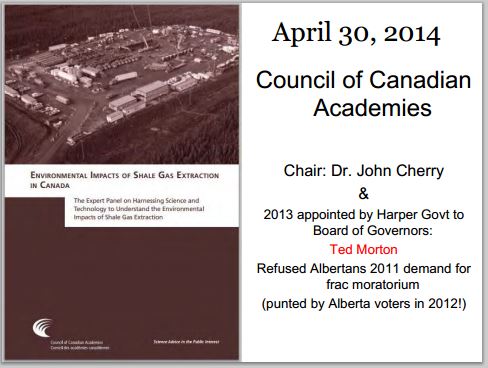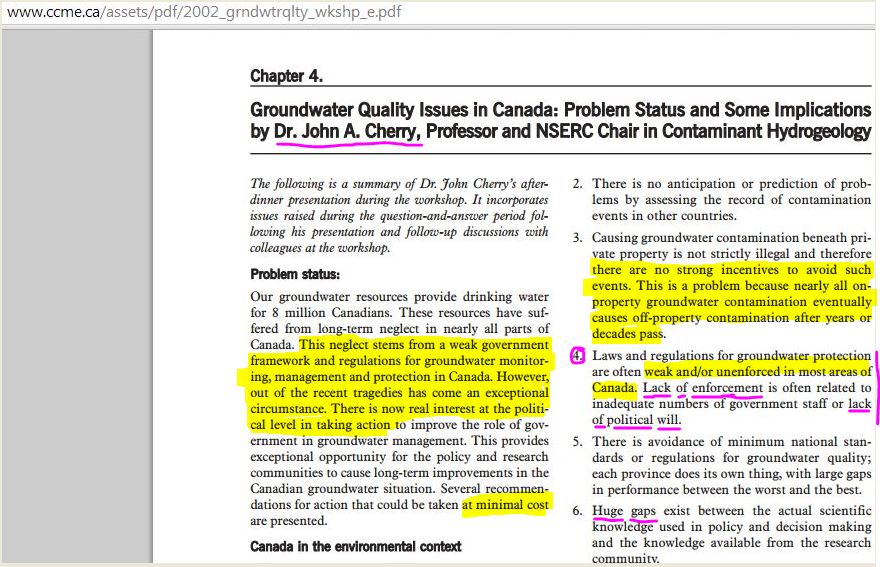Energy industry urging government to lift fracking moratorium by Jeremy Keefe, April 13, 2016, Global News
It has been a month and a half since the New Brunswick commission on Hydraulic Fracturing gave its recommendations to the provincial government, and there is still no word on whether a moratorium will be lifted. As Jeremy Keefe reports, that has drawn the ire of industry professionals.
Jobs and a boost to a struggling economy are two of the main reasons why energy companies say New Brunswick should lift its moratorium on hydraulic fracturing immediately.
“We have had, historically, natural gas development… going back to the 1800’s,” said Colleen Mitchell, President of the Atlantica Centre for Energy. “So, today it’s interesting that we have companies that have been operating in the province for over ten years successfully, environmentally sustainably, working in this industry and yet a moratorium was imposed basically shutting them down.”
“We would certainly advocate that the companies that have been operating here to that degree should be allowed to proceed and quite frankly, immediately.”
… Energy and Mines Minister Donald Arsenault said in a statement they’re “focused on diversifying the economy in order to create jobs” and “that’s why we appointed an independent commission to study the impacts of hydraulic fracturing on our health, water and environment.”
“We will take the appropriate time to review the Commission’s findings before making any final decisions. For the time-being, the moratorium will be maintained.” [Emphasis added]
McAdam, New Brunswick, hit by 51 small earthquakes since Feb. 12, Dozens of quakes were reported over a period of a few weeks, the largest having a magnitude of 3.7 by CBC News, March 1, 2016
- McAdam earthquakes have subsided says Mayor Frank Carroll
- Natural Resources Canada sends seismologist to record McAdam quakes
- Earthquake ‘swarm’ rattles New Brunswick village, breaks windows
- ‘Earthquake swarm’ shakes New Brunswick village
External Links
The McAdam area in southwestern New Brunswick has been hit by 51 very small earthquakes since mid-February, according to a seismologist with Natural Resources Canada.
That’s when Stephen Halchuk arrived in the village with seismometers, on the heels of reports of dozens of quakes over a period of a few weeks, the largest having a magnitude of 3.7.
Halchuk said the largest quake since then had a magnitude of 1.8 and all were within the top kilometre of the Earth’s crust, with at least 10 quakes felt by residents.
Though still unclear about what exactly is going on underground to cause the quakes, Halchuk said he believes it must be some small structure that’s relieving stress, as the earth’s plates move slowly past each other.
“The stress gets built up across the North American plate and gets relieved in the form of small earthquakes. So there must be some small structure here that’s allowing that stress to be released,” Halchuk said.
Mayor Frank Carroll said the village has been relatively quiet for the last week and a half, though there are still some rumblings. The Earthquakes Canada website lists the last felt quake on Feb. 24 and the last earthquake that registered was on Feb. 27.
The equipment will remain in the village for another couple of months and Halchuk said he hopes to pinpoint the fault source and understand what triggers an earthquake swarm.
He said he thinks it unlikely there will be large damaging quakes in the area, but can’t rule out that possibility. [Emphasis added]
NBASGA Statement on the New Brunswick Commission on Hydraulic Fracturing Report Press Release by NBASGA, March 1, 2016
The New Brunswick Anti-Shale Gas Alliance provides the following statement about the report issued last Friday by the New Brunswick Commission on Hydrofracturing.
The Commissioners recognized that the discussion about shale gas had to be looked at in the contexts of the immediate need to combat climate change, the lack of a coherent and forward-looking energy policy for the province, and the inadequacy of current institutions and procedures in New Brunswick to deal with either shale gas or with the new realities of a low-carbon world.
Quick Links:
Press Statement (pdf) – English
Communiqué (pdf) -Français
Accordingly, they laid out a series of recommendations to transition to that new world. While these recommendations are based on the shale gas experience, they are applicable to all energy and natural resource policies.
2016 HF commission report
- All policies must consider the impacts on climate change before proceeding, and must guarantee the ‘long-term viability’ of our water and energy resources.
- Environmental and energy policy should lead us into the new value-added and knowledge-based economy.
- The relationship between governments and First Nations must be rebuilt from the ground-up on a nation-to-nation basis.
- Discussions with First Nations, municipalities and citizens, especially those bearing the risks, must be based on the two-way flow of objective and scientifically valid information in order to do a valid risk/benefit analysis and to ask for social license.
- A Health Impact Assessment must be included with the Environmental Impact Statement. Both must examine cumulative effects over space and time, and look beyond a particular project in isolation.
[Ugly Reality Check:
US shale frackers eye world conquest despite bloodbath ]
- The mapping of aquifers and baseline data, such as water quality, air quality and health conditions, must be established before any development begins. Likewise, plans for ongoing scientific monitoring of air, water and health must be made for the life of the development.
These and other recommendations require fundamental changes and will take time, trust and work to accomplish, but the Commission notes that there are no shortcuts.
[Like the inhumane short cuts taken and still taken in Alberta, BC and Saskatchewan, after Dr. John Cherry and the Council of Ministers of the Environment recommended 14 years ago monitoring that never happened, with still no plans for any frac harm monitoring to begin in BC, Saskatchewan and Alberta?
Above from the 2002 CCME Report Groundwater Quality


Slides from Ernst presentations
The Commissioners recognized that due to the dismal economic state of the gas market we have the time, as it will be a number of years before shale gas ‘may’ become economical again. [Was it ever economical? Why the billions of dollars in taxpayer funded subsidies if it was? One example: Premier Brad Wall’s begging the Canadian government to make ordinary citizens responsible and pay to clean up the oil and gas industry’s leaking, sour mess he allows in Saskatchewan, setting up legal precedent for multinational oil and gas companies to walk from their responsibilities across the country.] In this we disagree with the Commission, as the economics of shale gas have deteriorated even further since its report went to press. Because of this – and the remarkable growth of clean energy technology – we believe that any economic case for shale gas will be eclipsed by the swift clean energy response to climate change.
As in any report of this size, there are some statements, assumptions and details with which we disagree. But, as to its conclusion that we need to leave behind a 20th century economy based on finite supplies of fossil fuels that can no longer be burned, we are in total agreement.
The government’s decision to impose a moratorium was prompted in great part by an unprecedented and united grassroots movement. Events since then, including the growing urgency of addressing climate change, the collapse of oil and gas prices, and the huge growth and decreasing costs of renewable energy, shows the decision was correct.
[Positive Interlude:
Superior electric cars are on their way, and they could begin to wreck oil markets within a decade by Bloomberg, February 24, 2016
Explained in a video.
It’s time for oil investors to start taking electric cars seriously.
In the next two years, Tesla and Chevy plan to start selling electric cars with a range of more than 200 miles priced in the $30,000 range. Ford is investing billions, Volkswagen is investing billions, and Nissan and BMW are investing billions. Nearly every major carmaker—as well as Apple and Google—is working on the next generation of plug-in cars.
This is a problem for oil markets. OPEC still contends that electric vehicles will make up just 1 percent of global car sales in 2040. Exxon’s forecast is similarly dismissive.
Quick Take Oil Prices
The oil price crash that started in 2014 was caused by a glut of unwanted oil, as producers started cranking out about 2 million barrels a day more than the market supported. Nobody saw it coming, despite the massively expanding oil fields across North America. The question is: How soon could electric vehicles trigger a similar oil glut by reducing demand by the same 2 million barrels?
That’s the subject of the first installment of Bloomberg’s new animated web series Sooner Than You Think, which examines some of the biggest transformations in human history that haven’t happened quite yet. On Thursday, analysts at Bloomberg New Energy Finance weighed in with a comprehensive analysis of where the electric car industry is headed.
Even amid low gasoline prices last year, electric car sales jumped 60 percent worldwide. If that level of growth continues, the crash-triggering benchmark of 2 million barrels of reduced demand could come as early as 2023. That’s a crisis. The timing of new technologies is difficult to predict, but it may not be long before it becomes impossible to ignore.

End Interlude]
The Commission Report provides reasons to strengthen that decision further by making it permanent.
“It is beyond dispute that the greatest numbers of jobs are being created in the clean energy economy,” says spokesman, Jim Emberger. “This is where investment is booming. Meanwhile, investments in fossil fuels are declining as thousands are laid off and many companies face bankruptcy.”
NBASGA appreciates the thoughtful approach the Commission has taken in fulfilling its mandate. Following its recommendations would enable New Brunswick to join the rest of the world in moving toward a future that will provide jobs, while protecting the health of our environment, ourselves and our communities. We would much prefer this road to a legal challenge over a declining industry. [Emphasis added]
Debriefing Elsipogtog, The Anatomy of a Struggle 206 pp by Miles Howe, May 2015
Donald Arseneault says shale gas industry must change approach, Energy minister says there is a lot of work to do before a fracking moratorium is lifted in New Brunswick by CBC News, February 29, 2016
Related:
- Shale gas commission calls for independent regulator if moratorium lifted
- Supporters, opponents doubt fracking will come to N.B. after report
- Anti-fracking protesters say report won’t lessen their resolve
Energy Minster Donald Arseneault says a recent report by the Liberal-appointed New Brunswick Commission on Hydraulic Fracturing shows that government and industry must take a different approach if shale gas development is ever going to move ahead.
“We need to rebuild our relationship with First Nations to regain that trust, as well we have to put communities in the middle of this process,” he said on Information Morning Moncton on Monday.
The three-person commission set out a detailed plan for the province to follow if it wants to lift its moratorium on shale gas exploration.
It included the recommendation of an independent regulator and a rethink of how the government consults citizens, including aboriginal people, on resource development.
“We have to include First Nations at the forefront,” Arseneault said.
“Not after, when all hell breaks loose and then people feel we have to talk to them … that’s not right, that’s not the way to go,” he said referring to the fracking protests of 2013 that ended in five police vehicles burned and 40 people arrested.
Arseneault pointed to the Trevali Mine, west of Bathurst and the controversial Sisson Mine, north of Fredericton, as examples of how industry can work with First Nations to provide training and employment to members.
“When I go visit Trevali Mine now I see First Nations actually working in the mine. To me that’s a success story that we need to replicate,” he said.
Industry must change approach
SWN Resources was the oil and gas company at the centre of the protests in southeastern New Brunswick and Arseneault called out the company specifically on Monday, saying SWN must change the way it does business.
“They’ve been very clear to me, they feel that in terms of First Nations they say that’s not their job. They say that’s the government’s job to consult with First Nations,” he said.
“I told SWN that is everybody’s job including SWN, so if you do want to do business in New Brunswick … these are issues that are very important and you’re going to have to work with it and if you don’t want to work with it chances are you’re not going to have operations here.”
In early 2015, SWN told the provincial government it was moving its resources out of New Brunswick because of the moratorium.
CBC News has contacted SWN Resources Canada for a response to Arseneault’s comments.
As for lifting the moratorium, Arseneault says “time will tell.”
“If industry and everybody around the table wants to really change the way we do things then I think we can see some positive outlook but do I think it’s there today? No,” he said. [Emphasis added]
From: NBCHF-CNBFH <email hidden; JavaScript is required>
To: NBCHF-CNBFH <email hidden; JavaScript is required>
Date: February 26, 2016 at 11:07 AM
Subject: Final report of the NB Commission on Hydraulic Fracturing | Rapport final de la Commission du Nouveau-Brunswick sur la fracturation hydraulique
La version française suit l’anglais.
Hello,
Thank you for your interest in the final report from the New Brunswick Commission on Hydraulic Fracturing.
You will find the full three-volume report here.
Again, thank you for your interest; it has been a pleasure to serve the people of New Brunswick.
Regards,
Marc Léger
John McLaughlin
Cheryl M.G. Robertson
Bonjour,
Nous vous remercions de l’intérêt que vous manifestez pour le rapport final de la Commission du Nouveau-Brunswick sur la fracturation hydraulique.
Vous trouverez le rapport complet en trois volumes ici.
Encore une fois, merci de votre intérêt; ce fut un plaisir d’être au service de la population du Nouveau-Brunswick.
Sincères salutations,
Marc Léger
John McLaughlin
Cheryl M.G. Robertson
Gas Opportunities report promises cure-all, despite dismal state of natural gas industry Press Release by NOFRAC, February 26, 2016
A report on Gas Opportunities for Atlantic Canada uses magical thinking and pie in the sky promises to lure Atlantic provinces governments to open the doors to shale gas development and fracking, says Barb Harris of the Nova Scotia Fracking Resource and Action Coalition.
The report from the Atlantic Institute of Market Studies (AIMS) claims Atlantic Canada is passing up tremendous economic opportunities by maintaining freezes on fracking for shale gas. “These are imaginary economic opportunities,” notes Harris. “The author forgot to mention that shale gas companies across North America are going bankrupt and laying off thousands of people, leaving behind abandoned wells, contaminated water and widespread health problems.”
In Nova Scotia, the government is on the hook to pay $100 million to the biggest oil company in the world, Exxon-Mobil, to help them shut down the offshore Sable gas field.
A CBC report yesterday stated that Canada’s largest natural gas producer, Encana, showed last quarter losses of more than $600 million and plans to cut another 20% of its staff this year.
The AIMS report urges Atlantic Provinces governments to lift bans and moratoriums on hydraulic fracturing. Harris says she hopes, and expects, the government to keep the fracking ban in place. “The reasons for maintaining a freeze on fracking for shale gas are exactly the same as they were when Nova Scotia’s passed the ban 16 months ago,” says Harris. “In fact, hundreds of new independent scientific studies have documented even more clearly the real and significant risks to water, public health, and the climate are. The science of the past 18 months shows how wise Nova Scotia was to ban fracking for shale gas.” The biggest change in that time is that with low oil prices, shale gas is even less economically viable than it was 16 months ago.
Along with the carrot of claimed economic opportunities, the report waves the threat of higher natural gas prices if Atlantic Canada does not allow shale gas development and fracking.
“The report goes through the ‘gas is better than coal” song and dance,’ notes Harris. “That’s so old, and not even true. With the price of renewable energy dropping rapidly, the energy challenge for governments now is to identify and support affordable energy options that are in step with the global changes required by the climate crisis. Natural gas is not that path.”
International experts agree that the biggest economic opportunities of the coming decades lie with in growth of renewable energy technologies. Prices for renewable energy, especially solar, are almost at parity with fossil fuels and dropping rapidly. As financial subsidies for fossil fuels are withdrawn, and a tax on carbon become part of the pricing picture, renewables are poised to become the affordable energy of the coming decades.
“Renewable energy is not the distant future, it’s around the corner,” says Harris. “Renewables, combined with energy efficiency programs, are the economic opportunities we need to embrace. Energy efficiency is a great job creator and by far the cheapest energy solution. It costs far less to save a kw of energy than to create it.”
“This report is a promotional piece for the natural gas industry. It should not be taken as anything else,” Harris concludes.
Barb Harris is a member of the Nova Scotia Fracking Resource and Action Coalition Steering Committee and the Environmental Health Association of Nova Scotia [Emphasis added]
[Refer also to:

